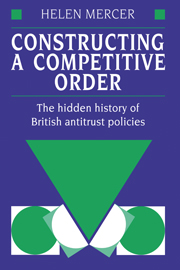Book contents
- Frontmatter
- Contents
- List of tables
- Acknowledgements
- Notes on conventions and abbreviations
- 1 Introduction
- 2 The British cartel system, 1880–1964
- 3 The state and the ‘monopoly problem’, 1880–1939
- 4 The war and the White Paper, 1940–44
- 5 The origins of the Monopolies and Restrictive Practices Act, 1948
- 6 Interpretation of policy – the Monopolies and Restrictive Practices Commission, 1949–56
- 7 The origins of the Restrictive Trade Practices Act 1956 – a re-interpretation
- 8 Resale price maintenance
- 9 Conclusions
- Appendixes
- Notes
- Bibliography
- Index
4 - The war and the White Paper, 1940–44
Published online by Cambridge University Press: 29 January 2010
- Frontmatter
- Contents
- List of tables
- Acknowledgements
- Notes on conventions and abbreviations
- 1 Introduction
- 2 The British cartel system, 1880–1964
- 3 The state and the ‘monopoly problem’, 1880–1939
- 4 The war and the White Paper, 1940–44
- 5 The origins of the Monopolies and Restrictive Practices Act, 1948
- 6 Interpretation of policy – the Monopolies and Restrictive Practices Commission, 1949–56
- 7 The origins of the Restrictive Trade Practices Act 1956 – a re-interpretation
- 8 Resale price maintenance
- 9 Conclusions
- Appendixes
- Notes
- Bibliography
- Index
Summary
Introduction
In May 1944 the wartime Coalition government published its White Paper on Employment Policy. This became the key economic policy document to emerge from the discussions on post-war Reconstruction and, like many other decisions of the Coalition government, was to bind the subsequent Labour government. It contained a clause which declared that policy towards cartels and combines was to be reviewed, and which implicitly criticised their restrictive effects:
Employers, too, must seek in larger output rather than higher prices the reward of enterprise and good management. There has in recent years been a growing tendency towards combines and towards agreements, both national and international, by which manufacturers have sought to control prices and output, to divide markets and to fix conditions of sale. Such agreements or combines do not necessarily operate against the public interest; but the power to do so is there. The Government will therefore seek power to inform themselves of the extent and effect of restrictive agreements, and of the activities of combines; and to take appropriate action to check practices which may bring advantages to sectional producing interests but work to the detriment of the country as a whole.
The general approach to cartels and large firms enunciated here was to be embodied in the 1948 Monopolies and Restrictive Practices Act, which similarly adopted an agnostic position on the effects of restrictionism, and established a system of enquiry and control.
- Type
- Chapter
- Information
- Constructing a Competitive OrderThe Hidden History of British Antitrust Policies, pp. 54 - 82Publisher: Cambridge University PressPrint publication year: 1995



